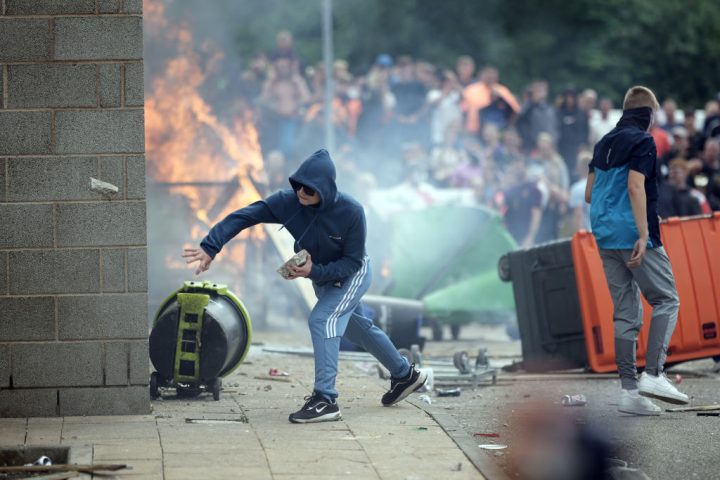Sir Keir Starmer is turning out to be something of a lucky general. The Prime Minister appears to have passed his first big test in government by quelling the violent and ugly unrest that has marred towns and cities across Britain in recent days. His tough stance on law and order – hundreds of arrests, rapid sentencing, and a huge police deployment to snuffle planned far-right protests – is working. Even so, the PM is taking no chances, with police forces ordered to ‘remain on high alert’: 6,000 riot officers will be deployed over the weekend as officers wait to see if the worst of the violence is finally over.
Starmer is lucky in the sense that this crisis has played to his strengths as a former public prosecutor. In his role as director of public prosecutions, Starmer oversaw the fast-track jailing of almost 1,000 people in the aftermath of the London riots in 2011. He knows how the system works. He has also been fortunate, in a sense, that the riots took place during the Commons summer recess, and that the Conservatives are distracted by their leadership contest. This has given him space to calibrate his response without facing pressure from his political opponents. So far, so good.
How will Starmer go about reducing such public anxieties about immigration?
But make no mistake: the events of recent days present a much bigger long-term set of problems for the government. How Starmer responds will reveal much more about his strengths and his limitations as a leader.
There are other difficult political realities bubbling away under the surface. Starmer has sounded strong on meting out justice, but actual delivery will prove much harder. The government insists it has plenty of space in prisons to deal with the huge number of rioters now being processed through the courts. But there is no disguising the fact that the prison system is buckling under the strain. Only this week, the union for prison governors warned that a surge of inmates in numbers similar to 2011 would ‘cripple and destabilise’ England’s prison system. The most recent figures, published this month by the Ministry of Justice, show the prison population stood at 87,362 in England and Wales: full capacity is 88,818.
The government says 500 more prison places are being created. Yet ministers also plan to release certain prisoners after just 40 per cent of their sentences. It begs the question of whether some rioters who are dealt ‘swift justice’ could end up being released less than halfway through their sentences. There are also growing questions about the long-term sustainability of higher policing levels. The National Police Chiefs’ Council estimates the force needs an additional £3.2 billion to enable more officers to return to the streets and restore stable levels of service. Where is that money going to be found?
The real policy challenge for the government comes down to its plans for dealing with the issue of immigration. Polling carried out by YouGov in the wake of the recent riots found 85 per cent of Britons opposed the unrest. But the public also thinks there are longer-term political causes, with two-thirds of Britons saying immigration policy over recent years had contributed to the situation.
How will Starmer go about reducing such public anxieties about immigration? Does he have the language and political vision to heal the divisions on display? After all, even his strongest allies would concede that he is far from inspirational as a public speaker, yet this is what is being asked of him now as prime minister.
The unrest has also brought into fresh focus the role of tech firms and social media in spreading falsehoods and misinformation. The Online Safety Act, which empowers the media regulator to fine social media platforms that fail to tackle disinformation, isn’t due to come into force until next year. But the London mayor, Sadiq Khan, believes the act as it stands is not fit for purpose. Starmer has suggested he agrees, and that the legislation is to be reviewed. This can only mean more delay and confusion.
A level of law and order has been restored in recent days, but it will take much longer to repair the damage to public trust. Fear has stalked the streets in many towns and cities. Some of those behind the violent unrest have shown open contempt for the police. Starmer is to be congratulated for getting to grips with the widespread violence and disorder, which at one point looked like in danger of spiralling out of control. It was a necessary and important first step. He must now offer solutions to the deep-rooted problems that lie behind this summer’s violence and protests.







Comments